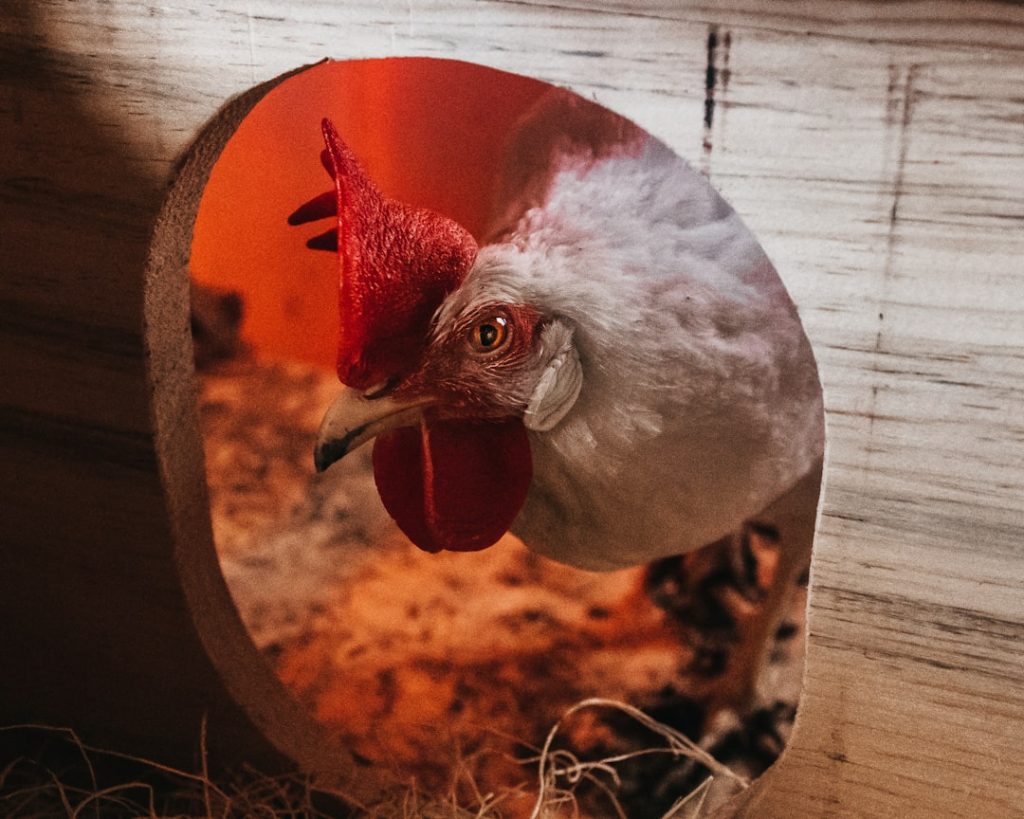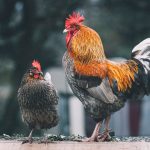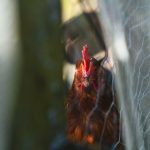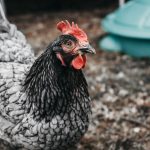When selecting a fence for chickens, several key factors should be considered. The fence height is crucial, with a minimum of six feet recommended to prevent chickens from flying over. Sturdiness and security are essential, as chickens are adept at finding escape routes.
Wire mesh fencing is a popular choice, offering both security and visibility. The mesh gaps should be small enough to deter predators while allowing adequate airflow and sunlight. The fence material is another important consideration.
While wood may be aesthetically pleasing, it can deteriorate in wet or humid conditions. Metal fences are more durable and long-lasting, making them practical for chicken enclosures. To prevent predators from digging underneath, the fence should be buried several inches into the ground.
A secure gate is necessary for easy access while maintaining the flock’s safety. By carefully evaluating these factors, chicken owners can select an appropriate fence that provides the necessary security and protection for their flock to thrive.
Table of Contents
- 1 Ensuring Proper Security and Protection
- 2 Providing Adequate Space and Shelter
- 3 Creating a Safe and Comfortable Environment
- 4 Implementing Regular Maintenance and Inspections
- 5 Managing Chicken Behavior and Social Interactions
- 6 Addressing Potential Predators and Threats
- 7 FAQs
- 7.1 What are the benefits of keeping chickens in a fenced area?
- 7.2 What type of fencing is best for keeping chickens?
- 7.3 How can I ensure that my chickens stay safe within the fenced area?
- 7.4 What should I consider when designing a fenced area for chickens?
- 7.5 Are there any legal considerations for keeping chickens in a fenced area?
Key Takeaways
- Choose a sturdy and predator-proof fence for your chickens, such as hardware cloth or welded wire.
- Ensure that the coop and run are secure with locks and latches to prevent predators from accessing the chickens.
- Provide ample space for your chickens to roam and a shelter that protects them from the elements and predators.
- Create a comfortable environment with proper bedding, nesting boxes, and perches for your chickens to rest and lay eggs.
- Regularly inspect and maintain the fence, coop, and run to address any potential issues and keep your chickens safe.
Ensuring Proper Security and Protection
Predator-Proofing the Enclosure
This involves not only choosing the right fence, but also taking additional measures to prevent predators from gaining access to your flock. This can include adding a secure roof or cover to your chicken enclosure to prevent aerial predators such as hawks and owls from swooping in and attacking your chickens. Additionally, consider adding a predator apron or skirt around the perimeter of the fence to prevent digging predators such as foxes and raccoons from gaining access to your chickens from below.
Providing a Safe Shelter
Another important aspect of ensuring proper security and protection for your chickens is providing them with a safe and secure shelter. This can include a sturdy coop or hen house where your chickens can roost at night and seek refuge from predators. Make sure that the coop is well-constructed and predator-proof, with secure latches and locks on all doors and windows.
Additional Security Measures
Consider adding additional security measures such as motion-activated lights or alarms to deter potential predators from approaching your chicken enclosure. By taking these steps to ensure proper security and protection for your chickens, you can provide them with a safe and secure environment where they can thrive without fear of predators.
Providing Adequate Space and Shelter
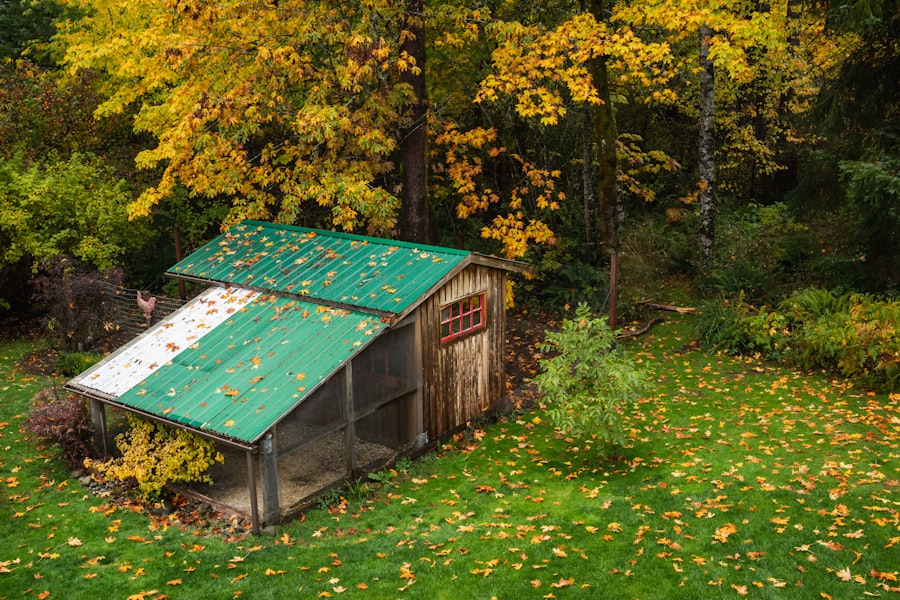
Providing adequate space and shelter for your chickens is essential for their health and well-being. When it comes to space, the general rule of thumb is to provide at least 4 square feet of space per chicken inside the coop, and at least 10 square feet of space per chicken in the outdoor run. This will allow your chickens plenty of room to move around, stretch their wings, and engage in natural behaviors such as dust bathing and foraging.
Additionally, providing ample space can help reduce stress and aggression within the flock, leading to a more harmonious and contented group of chickens. In addition to providing adequate space, it’s important to ensure that your chickens have a safe and secure shelter where they can roost at night and seek refuge from the elements. This can include a well-constructed coop or hen house that provides protection from predators, as well as shelter from wind, rain, and extreme temperatures.
Make sure that the coop is well-ventilated to provide adequate airflow, while still protecting your chickens from drafts and moisture. Consider adding roosting bars and nesting boxes inside the coop to provide your chickens with comfortable and secure places to rest and lay eggs. By providing adequate space and shelter for your chickens, you can create a safe and comfortable environment where they can thrive.
Creating a Safe and Comfortable Environment
Creating a safe and comfortable environment for your chickens is essential for their overall well-being and happiness. One of the most important aspects of this is providing them with clean bedding inside their coop or hen house. This can include materials such as straw, wood shavings, or shredded paper, which provide a soft and comfortable surface for your chickens to rest on.
Make sure to regularly clean out the bedding and replace it with fresh material to prevent the buildup of bacteria and parasites that can lead to health issues for your flock. Another important aspect of creating a safe and comfortable environment for your chickens is providing them with access to fresh water at all times. Make sure that your chickens have access to clean water that is free from contaminants such as algae or debris.
Consider using a waterer with a built-in filter or regularly clean and refill their water containers to ensure that they always have access to fresh water. Additionally, provide your chickens with a balanced diet that includes a mix of high-quality feed, fresh fruits and vegetables, and access to insects and other natural treats. By creating a safe and comfortable environment for your chickens, you can ensure that they are happy, healthy, and thriving.
Implementing Regular Maintenance and Inspections
Implementing regular maintenance and inspections of your chicken enclosure is essential for ensuring the safety and well-being of your flock. This can include regularly checking the condition of the fence, coop, and other structures within the enclosure to identify any signs of wear or damage that could compromise their security. Make sure to repair any damaged areas or weak spots in the fence, as well as any holes or gaps that could allow predators to gain access to your chickens.
Additionally, inspect the coop for signs of wear or damage, such as rotting wood or loose hardware, and make any necessary repairs or replacements to keep it secure. In addition to regular maintenance, it’s important to implement regular inspections of your flock to monitor their health and well-being. This can include checking for signs of illness or injury, as well as monitoring their behavior and egg production.
Make sure to provide regular veterinary care for your chickens, including vaccinations and parasite control, to prevent common health issues that can affect their overall well-being. By implementing regular maintenance and inspections of your chicken enclosure and flock, you can ensure that they are safe, healthy, and thriving.
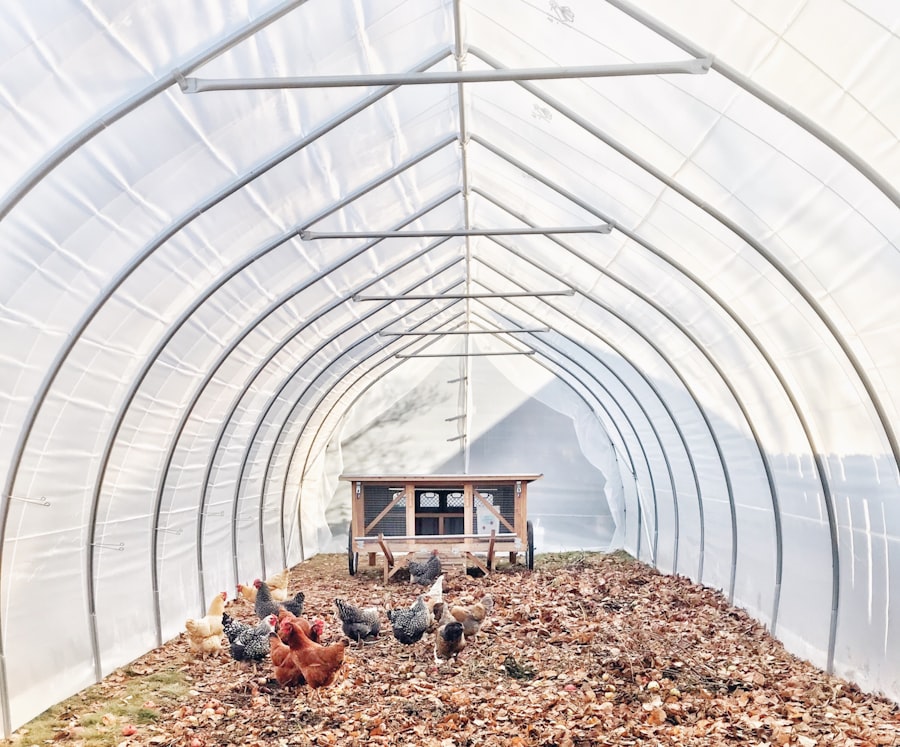
Natural Behaviors and Environmental Enrichment
Chickens need to engage in natural behaviors such as dust bathing, foraging, and roosting. To facilitate this, provide access to natural materials like sand or dirt for dust bathing, and ensure plenty of space for foraging and exploring their environment.
Roosting and Resting
Adequate roosting space inside the coop is essential for chickens to rest comfortably at night. Ensure that the coop provides enough space for all chickens to roost comfortably, reducing stress and promoting a good night’s sleep.
Addressing Aggression and Bullying
Managing aggression and bullying within the flock is vital. To prevent competition for resources, provide multiple feeding stations and waterers. Additionally, ensure that individual chickens have enough space to establish their own territories within the flock. Consider adding visual barriers like partitions or hiding spots to provide shy or submissive chickens with escape routes from more dominant individuals. By addressing these issues, you can create a harmonious and contented group of chickens that thrive.
Addressing Potential Predators and Threats
Addressing potential predators and threats to your flock is essential for ensuring their safety and well-being. One important aspect of this is identifying common predators in your area and taking measures to prevent them from gaining access to your chickens. This can include installing predator-proof fencing around the perimeter of the enclosure, as well as adding additional security measures such as motion-activated lights or alarms to deter potential predators from approaching.
Additionally, consider providing your chickens with a safe retreat within their enclosure where they can seek refuge from potential threats. This can include adding hiding spots such as dense shrubs or bushes where they can escape from aerial predators, as well as providing them with a secure coop or hen house where they can roost at night without fear of attack. By addressing potential predators and threats to your flock, you can create a safe and secure environment where they can thrive without fear.
In conclusion, choosing the right fence for your chickens is essential for providing them with the security and protection they need to thrive. Ensuring proper security and protection involves predator-proofing their enclosure and providing them with a safe shelter where they can seek refuge from potential threats. Providing adequate space and shelter is essential for their health and well-being, while creating a safe and comfortable environment involves maintaining clean bedding, providing access to fresh water, and offering a balanced diet.
Implementing regular maintenance and inspections is essential for ensuring their safety and well-being, while managing chicken behavior and social interactions involves providing them with opportunities for natural behaviors and addressing signs of aggression within the flock. Finally, addressing potential predators and threats involves identifying common predators in your area and taking measures to prevent them from gaining access to your flock. By carefully considering these factors, you can create a safe and secure environment where your chickens can thrive without fear of predators or threats.
If you’re looking for more tips on how to keep chickens in a fence, you might want to check out this article on converting a shed into a chicken coop. It offers valuable insights on repurposing existing structures to create a safe and comfortable environment for your feathered friends.
FAQs
What are the benefits of keeping chickens in a fenced area?
Keeping chickens in a fenced area provides them with protection from predators, allows for better control of their environment, and helps to prevent them from wandering into areas where they may cause damage.
What type of fencing is best for keeping chickens?
The best type of fencing for keeping chickens is one that is sturdy and secure, such as hardware cloth or welded wire. It should be tall enough to prevent chickens from flying over it and buried into the ground to prevent predators from digging underneath.
How can I ensure that my chickens stay safe within the fenced area?
Regularly inspect the fencing for any signs of damage or weakness, and promptly repair any issues. Additionally, provide the chickens with a secure coop within the fenced area for them to roost and lay eggs.
What should I consider when designing a fenced area for chickens?
When designing a fenced area for chickens, consider the size of the area, the type of terrain, and the number of chickens you plan to keep. Also, ensure that the fencing is tall enough to allow the chickens to move around comfortably and provide them with access to shade and shelter.
Are there any legal considerations for keeping chickens in a fenced area?
Before keeping chickens in a fenced area, check local regulations and zoning laws to ensure that it is allowed in your area. Some areas may have restrictions on the number of chickens allowed or the type of fencing that can be used.
Meet Walter, the feathered-friend fanatic of Florida! Nestled in the sunshine state, Walter struts through life with his feathered companions, clucking his way to happiness. With a coop that’s fancier than a five-star hotel, he’s the Don Juan of the chicken world. When he’s not teaching his hens to do the cha-cha, you’ll find him in a heated debate with his prized rooster, Sir Clucks-a-Lot. Walter’s poultry passion is no yolk; he’s the sunny-side-up guy you never knew you needed in your flock of friends!

